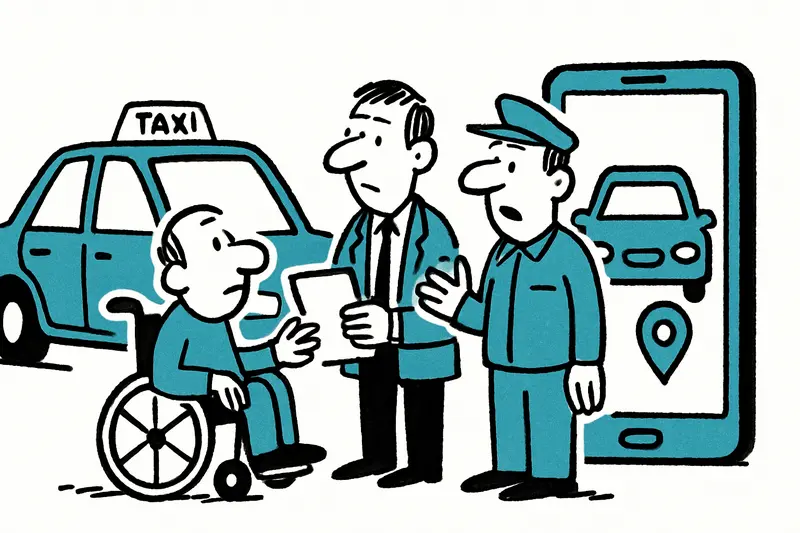
New Taxi Rules in Mallorca: Caps, Ramps and the App — Will the Plan Match the Island's Rhythm?
The regulatory council reorganizes taxis and VTCs: license caps, mandatory accessible vehicles and a public app. What consequences will this have for passengers, drivers and tourism?
What does the decision really propose?
On Monday the regional regulatory council approved a draft intended to reorganize taxis and chauffeur services (VTC) in Mallorca. In short: license caps, mandatory accessible vehicles and a public coordination app. On paper the decision sounds like order. On the street — on the Passeig, in front of the airport, in El Arenal — people hear questions, doubts and the warm wind from the sea.
The key question
Will the new rules address the island’s peaks in supply and demand without overburdening drivers or treating people with mobility impairments as a mere token gesture? That is the central question, which so far has often only appeared at the margins of political statements.
Sharp points in the draft
The main changes can be stated clearly: each island will have caps on taxi and VTC licenses; a recent ruling — Court forces Balearic government: 600 Uber licenses must be re-examined — shows the legal complexities. A needs assessment will be prepared every five years, taking into account population figures, tourist numbers, ports, train stations and infrastructure. At least 5% of fleets must be accessible; for VTC companies with more than ten vehicles the share rises to 10%. And: a state-run app should improve coordination and reduce empty runs.
What is often missing from the discussion
Three topics have so far been underexamined: seasonal flexibility, the affordability of conversions and enforcement of the rules. Mallorca in summer is a very different place than in November. The market fluctuates massively — any driver who stands at the airport at 7:30 a.m. and pushes the first suitcases along the terminal knows that. Local experiments such as Unified Taxi Tariff in North and Central Mallorca — Relief for Passengers or a New Problem for Drivers? have already altered pickup rules between municipalities. A blanket cap can cause shortages during peak times, while in the low season it can lead to oversupply with parked vehicles and falling incomes.
Accessibility: a sensible but costly step
The requirement for ramp-capable vehicles is correct and welcome in principle. But who will cover the costs of conversion or replacement? Small operators and one-person businesses face a financial hurdle. Without concrete subsidy programs, the quota may be met on paper but in practice lead to higher prices or the exit of small providers.
The app — opportunity or control?
A public app can shorten waiting times and reduce empty runs. Properly implemented, it would relieve streets such as Avinguda Gabriel Roca and reduce emissions. What remains unclear is how open the platform will be to existing providers, which data will be stored, and how fair the allocation logic will be. Taxi drivers, concierges and bus drivers are watching the project closely: a poor algorithm can favor what is already established.
Concrete risks
Some of the less visible dangers: black-market vehicle networks could try to circumvent the limits. Seasonal fluctuations could give rise to informal “summer licenses,” and enforcement of accessibility standards could be lax. And: if retrofit costs are passed on to passengers, prices could rise in the high season — exactly when demand is high and many visitors depend on reliable mobility.
Solutions that should be on the table now
The proposal can be improved in theory — with a few concrete measures:
1) Seasonal license flexibility: introduce temporary short-term licenses for peak months, linked to transparent controls and fair access for both established and new providers.
2) Subsidy programs for accessibility: grants, low-interest loans or leasing schemes so small businesses don't drop out at the first ramp installation. Driver training should be mandatory and subsidized.
3) Open app standards: the state app should have an open API, guarantee data protection and disclose the allocation algorithm. Pilot projects in Palma and at airports could reveal problems early.
4) Stricter enforcement and sanctions: mobile inspections at ports and train stations, regular audits of accessibility and fines for attempts to circumvent the rules.
What happens now
The draft goes out for consultation. Then municipalities, driver associations and citizens will be able to comment, building on recent moves such as Shared taxi service: 13 Mallorcan municipalities take the step across borders. If the regulation comes into force, the practical work begins: license allocation under the new rules, conversions, training and the first test phase of the app. On the streets we'll then hear whether theory and practice come together — the honking on the Passeig, the clatter of suitcases at the airport and the soft whirr of accessible ramps will reveal it.
Conclusion: The goals are right — more accessibility, fewer empty runs, clearer rules. The decisive factor will be the design: who pays for conversions, how flexible the licenses are, and how transparent the new app is. The answers to these questions will decide whether island mobility becomes fairer or just different.
Similar News

"No Moment to Escape": How human trafficking in Mallorca seeps into everyday life
The liberation of 15 women is only the tip of the iceberg. How debt, missing papers and a poor labor market drive people...

Hundreds of Cancellations, Many Questions: What Fischer Air Means for Mallorca
A small airline, big uncertainty: Hundreds of Mallorca flights from Kassel-Calden Airport were canceled. What risks rema...

When Roosters Conquer the Island: Who Will Stop the Wild Chickens on Mallorca?
Feral domestic chickens populate roundabouts, industrial areas and town centers. Who is liable in accidents, who monitor...

A Quiet Oasis at Plaça d'Espanya: The New Café Terminus in Palma
Between metro towers and commuter flows, a small café has opened on the ground floor of the restored Hostal Terminus, of...

Why Justus' Death Is More Than a Farewell: A Look at Street Music, Homelessness and Urban Development
Justin 'Justus' Kullemberg, a violinist and well-known street musician on Ibiza, died last week. His life on the street ...
More to explore
Discover more interesting content

Experience Mallorca's Best Beaches and Coves with SUP and Snorkeling

Spanish Cooking Workshop in Mallorca
